Conference and Program Director
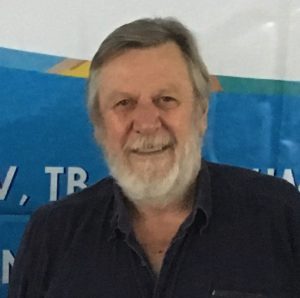 Nick Crofts AM, Director, Centre for Law Enforcement and Public Health, Australia, Honorary Professorial Fellow, University of Melbourne (Chairperson)
Nick Crofts AM, Director, Centre for Law Enforcement and Public Health, Australia, Honorary Professorial Fellow, University of Melbourne (Chairperson)
Professor Nick Crofts is an epidemiologist and public health practitioner who has been working in the fields of HIV/AIDS, illicit drugs, harm reduction and law enforcement for over 30 years. His major epidemiological work has been on the control of HIV and hepatitis C among injecting drug users in Australia (for which he received an NHMRC Senior Research Fellowship) and globally, including almost every country in Asia, for which he received the International Rolleston Award from the International Harm Reduction Association in 1998, and was made a Member of the Order of Australia in 2018.
He was at the Burnet Institute for Medical Research and Public Health for 19 years, where he was instrumental in building its Public and International Health arms, and was Deputy Director for five years. He was Director of Turning Point Alcohol and Drug Centre for three years, and then at the Nossal Institute for Global Health for three years. He was Visiting Senior Research Fellow at the UN Interregional Crime and Justice Research Institute in Turin in 2012, and is currently a Senior Expert at the International Development Law Organization in The Hague, resident in Amsterdam. He has been a member of Australia’s National Council on AIDS three times, and has performed multiple consultancies for WHO, UNAIDS, UNODC, AusAID and other bilateral and multilateral agencies.
As a designer and technical director of AusAID’s flagship HIV/AIDS program in Asia, ARHP 2002-2007, he was instrumental in building capacity among SE Asian police forces in relation to HIV, and has worked in many settings forging relationships between police and public health. Through the Centre for Law Enforcement and Public Health, of which he is founding Director, he founded the Law Enforcement and HIV Network (LEAHN) in 2009, and is Director of the annual Law Enforcement and Public Health Conferences (LEPH2019, Edinburgh, October 2019) from which the Global Law Enforcement and Public Health Association has grown.
He is married to his best friend, Kerri, and has four remarkable young women as daughters.
Program Committee
 Dr Elizabeth Aston, Director, Scottish Institute for Policing Research
Dr Elizabeth Aston, Director, Scottish Institute for Policing Research
Twitter @AstonLiz
Dr Liz Aston is the Director of the Scottish Institute for Policing Research (SIPR), and an Associate Professor of Criminology at Edinburgh Napier University (ENU). She is on the International Advisory Board for the N8 Policing Research Partnership and an invited member on various Police Scotland external reference groups. Dr Aston has a strong record of collaborative research on policing both in Scotland and in Europe, and is experienced in knowledge exchange and building strong research-practitioner relationships.
Liz’s research interests centre on intersections between criminal justice and other policy areas such as health, e.g. policing and substance use. She has conducted research on the relationship between substance use and offending; community policing; stop and search; local policing in Scotland; and youth diversionary projects.
Liz was a joint work package leader on ‘Unity’, a €4.6 million Horizon 2020 EC funded project on Community Policing, technology and communication between the police and public. She is currently involved in a COST Action on ‘Police Stops’ in Europe, having conducted research on stop and search in Scotland.
Previous roles at ENU have included: Head of Social Sciences, Depute Programme Leader for the MSc Applied Criminology and Forensic Psychology, and Programme Leader for BA (Hons) Criminology. Prior to joining the University in 2011, Liz held a SIPR Postdoctoral Research position and worked at the Medical Research Council’s Social and Public Health Sciences Unit in Glasgow.
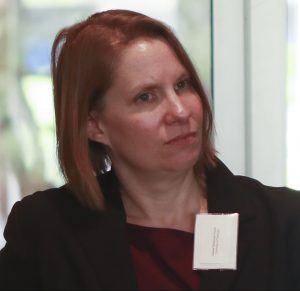 Dr Isabelle Bartkowiak-Theron
Dr Isabelle Bartkowiak-Theron
Senior Researcher, Tasmanian Institute of Law Enforcement Studies
Twitter @isabtkwk
Dr Isabelle Bartkowiak-Theron is the coordinator of Police Studies in the School of Social Sciences at the University of Tasmania, and a senior researcher at the Tasmanian Institute of Law Enforcement Studies (TILES). Isabelle specialises in the qualitative and quantitative study of policing and policing services targeting vulnerable populations (e.g., young people, refugees, Aboriginal community members) and is in regular contact with representatives of these vulnerable populations.
 Richard Bent, Senior Research Fellow, Institute for Canadian Urban Research Studies, Simon Fraser University
Richard Bent, Senior Research Fellow, Institute for Canadian Urban Research Studies, Simon Fraser University
Richard has been a Senior Research Associate with the Institute for Canadian Urban Research Studies (ICURS), Simon Fraser University, British Columbia, since 2009. Prior to joining ICURS he served 35 years as a member of the Royal Canadian Mounted Police in a variety of diverse roles, and ended his career in the executive ranks of the RCMP.
Richard’s research interests include mental health calls for service, policing complexity, performance management for police organizations, national security, governance, and public policy pertaining to justice and policing issues.
Richard has developed strong ties with CEAMOS at the University of Chile and Griffith University, Brisbane, Australia.
 Chief Inspector Michael Brown, Mental Health Co-ordinator, College of Policing, UK
Chief Inspector Michael Brown, Mental Health Co-ordinator, College of Policing, UK
Twitter @mentalhealthcop
www.facebook.com/
Michael is the mental health coordinator for the National Police Chiefs’ Council and the College of Policing – a serving officer with West Midlands Police for 21 years. His work in the UK has prevented tens of thousands of vulnerable people being detained in police custody whilst in mental health crisis and secured the prosecution of many vulnerable offenders who pose a serious risk of harm to the public. His blog on policing and mental health has been used millions of times across the world and used is the basis for national guidelines for the police service in England and Wales.
He was singled out for commendation by the Home Affairs Committee of the UK Parliament after their inquiry into policing and mental health and has advised the British Government on reform of mental health laws. Michael has given expert opinion in UK and Australian Coroner’s Courts following deaths in custody or contact and also worked in Namibia, Iceland and Canada. He is a recipient of the President’s Medal from the Royal College of Psychiatrists and in 2016 was appointed an OBE by Her Majesty, Queen Elizabeth in the 90th Birthday Honours for his services to policing and mental health.
Michael is a Chief Inspector in West Midlands Police, currently seconded to the College of Policing and the National Police Chiefs Council as the Mental Health Coordinator.
 Dr Ian de Terte, Senior Lecturer, Department of Psychology, Massey University, New Zealand
Dr Ian de Terte, Senior Lecturer, Department of Psychology, Massey University, New Zealand
Twitter: @DrIandeTerte
Dr de Terte is a clinical psychologist and senior lecturer in clinical psychology. He teaches into the clinical psychology training programme at Massey University,Wellington, New Zealand. He has research interests in: (1) psychological resilience (this includes post traumatic growth, prevention strategies, and survival behaviour); (2) psychological trauma (this includes post traumatic stress disorder, secondary traumatic stress, vicarious trauma, and disaster mental health); and (3) high-risk occupations (e.g., police officers, and military personnel). The research methodologies that he utilises are moderation/mediation analysis, meta-analysis, randomised controlled trials,single-case design, and technological techniques. In addition to his research interests, Dr de Terte has clinical interests in forensic psychology, intellectual disability, and sports psychology. He is a specialist assessor in New Zealand pursuant to the Intellectual Disability (Compulsory Care and Rehabilitation) Act 2003.He has been fortunate to be involved in clinical or research work in some remote locations such as Phuket, Pitcairn Island, and Dubai. In his “previous life” he was a police detective with the New Zealand Police.
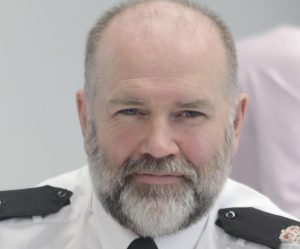 Superintendent Stan Gilmour, Local Policing Area Commander, Thames Valley Police, Reading, UK
Superintendent Stan Gilmour, Local Policing Area Commander, Thames Valley Police, Reading, UK
Twitter @StanGilmour
Stan is the Commander of police in Reading, Berkshire, UK, and a member of the Global Law Enforcement and Public Health Association. He is a Visiting Policy Fellow in the Institute for Policy Research at the University of Bath, and an External Examiner for the London Metropolitan UniversitySchool of Social Sciences’ Doctorate, Master, and Bachelor degree programmes in policing and leadership.
Stan has a wide operational policing background including as a senior detective, having worked in Armed Policing, Counter Terrorism, Major Crime, Intelligence, Organised Crime, and Neighbourhood Policing roles at local, regional, national, and international levels Stan brings a diverse perspective to his work.
Stan Chairs or is a member of several local partnership boards dealing with community safety, health, and wellbeing e.g. Youth Justice Partnership Board, Community Safety Partnership Board, Health and Wellbeing Board, Local Safeguarding Boards for Adults and Children, and the Troubled Families Management Board as well as chairing national cross-sector partnership Working Groups dealing with extreme risk and vulnerability e.g. Threats to Life and Online Blackmail. He was a member of the College of Policing Guidelines Committee for the establishment of the new Neighbourhood Policing Guidelines, published in 2018. He is a member of the national Police and Public Health Consensus Working Group and the Public Health Reduction in Child Crime and Recidivism Group, he is a also a member of the national Criminal Justice and Acquired Brain Injury Group, and the convener of the international Police and Public Health Research Group.
He is a Trustee of Connect Reading, a charity bringing business and communities together, a Strategic Adviser to Ethical Reading, a group seeking to establish more ethical business processes, and a founder of Reading’s cross sector community development group, and is also a Chair of School Governors.
Stan’s current areas of interest include the establishment of Trauma Informed Practice and Trauma Informed Communities and the development of Problem Solving Policing across Thames Valley.
Stan is widely published in areas of policing, organised crime, counter terrorism, and professional standards, and has been a guest lecturer in prominent universities at home and abroad. He is an International Advisor for the European Review of Organised Crime and his next book, an edited volume on Organised Crime and Politics, is due for publication in Spring 2019 by Edward Elgar.

Inga Heyman, Lecturer, Mental Health and Nursing, Edinburgh Napier University, Scotland
Twitter @heyman_inga
Inga is a Lecturer in Mental Health and Adult Nursing at Edinburgh Napier University, Scotland, with research, teaching and clinical interest in the interface between health, policing and vulnerable groups. Prior to joining higher education she worked in health and police services in the UK and Australia for over 30 years with a focus on substance use in pregnancy, the commercial sex industry, suicide, self-harm, custody healthcare and public protection.
She has worked with the Scottish Government and Police Scotland in relation to policing and mental health responses. She is currently completing her doctoral studies focusing on the interface and pathways between police, those in mental health distress and emergency health services. She is a member of the Scottish Institute of Policing Research (SIPR) network with a particular focus on law enforcement and public health.
 Dr Melissa Jardine, Gender Adviser and Communications Manager, Centre for Law Enforcement and Public Health, Australia
Dr Melissa Jardine, Gender Adviser and Communications Manager, Centre for Law Enforcement and Public Health, Australia
Twitter @majardine
Melissa Jardine, PhD is on the Board of Directors for the Global Law Enforcement & Public Health Association and Gender Advisor & Communications Manager for the Centre for Law Enforcement & Public Health.
Melissa was a Victoria Police officer for 10 years (2001-2011) working at the frontline and in criminal investigations. Melissa has long term interest in the development of policing in Asia and completed her PhD on policing in Vietnam at the UNSW Law School. She is the Regional Research Lead Consultant to the United Nations Office on Drugs and Crime and UN Women in relation to gender, policing, border control and transnational crimes in ASEAN.
Melissa has written and delivered a range of international police training packages regarding HIV prevention, harm reduction approaches to drug use and sex work, and police-public health leadership. In 2005, she was the recipient of an award from the Victorian Multicultural Commission while working for Victoria Police, and, was selected as an Asia 21 Young Leader by the Asia Society in 2017.
Melissa completed a Master of Asian Studies at Monash University in 2006 with a focus on the relationship between provincial economic growth in China and capital punishment for economic crimes, and studied Counter-terrorism in ASEAN. She completed a Master of Philosophy in the Faculty of Medicine at Melbourne University in 2013 for examining police culture and police responses to the implementation of drug harm reduction programs in Vietnam. Melissa was featured in the Victoria Police ‘Badge and Beyond’ Police Life magazine in Winter 2017.
 Dr Katy Kamkar, Clinical Psychologist, Centre for Addiction and Mental Health, Canada
Dr Katy Kamkar, Clinical Psychologist, Centre for Addiction and Mental Health, Canada
Twitter @DrKatyKamkar
Linkedln: Dr. Katy Kamkar
Dr. Katy Kamkar, Ph.D., C. Psych., is a Clinical Psychologist at the Centre for Addiction and Mental Health (CAMH). She is an Assistant Professor within the Department of Psychiatry, University of Toronto. She is Director of Badge of Life Canada (BOLC) which is a peer-led national charitable organization for Police and Corrections/First Responders across Canada who are dealing with psychological injuries suffered in the line of duty. She is also within the Board of Directors, Operation Lifesaver Canada (OL) – Funded by the Railway Association of Canada and Transport Canada focusing on National Action Plan for Railway Suicide Prevention. She is the Provincial Mental Health Advisor to St. John Ambulance Ontario’s Council.
Dr. Kamkar is a Member of the Collaborative Centre for Justice and Safety (CCJS) Advisory Council. She is on the Editorial Board of the Journal of Community Safety & Well-Being (CSWB); is within the Scientific Advisory Committee of Anxiety Canada; a Founding & Credentialed Member of the Canadian Association of Cognitive Behavioural Therapies (CACBT).
She provides Evidence-Based Assessment services, Independent Medical Evaluation, Disability Management services and Evidence Based Psychological Treatment for Mood and Anxiety Disorders, Trauma and Stressor Related Disorders in particular Post Traumatic Stress Disorder (PTSD), Obsessive Compulsive Spectrum Disorders, First Responders Operational Stress Injuries and on Psychological Distress in the Workplace. She was also the Medical Practitioner for the Invictus Games Toronto 2017 and closely worked with Service Members/Veterans during the Invictus Games launched by Prince Harry. She has been part of building the Toronto Police Service Competencies for Front Line and Leadership to achieve modernization efforts and strive towards a culture of excellence.
One of her greatest interests is to provide education to the public to promote mental health awareness and well-being. She has provided numerous Public Relations / TV Media appearances, including launching mental health series and writing mental health articles and blogs for various comprehensive public resources.
Dr. Kamkar provides ongoing Education and Workshops to Ministries and Organizations (Local, National and International), including First Responders Organizations. Her areas include Workplace Mental Health, Stress/Anxiety Management, Work/Life Balance and Building Resiliency; Disability Management and Evidence-Based Best Practice Guidelines/Policies for Return To Work/Stay At Work for Workers with Mental Health Conditions; and on Occupational Trauma, Operational Stress Injuries and Resiliency. Read more
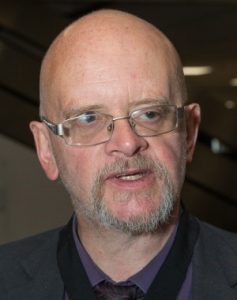 Professor John Middleton, PrFPH, FRCPL, President, UK Faculty of Public Health
Professor John Middleton, PrFPH, FRCPL, President, UK Faculty of Public Health
Honorary Professor of Public Heath at Wolverhampton University. He is President of the United Kingdom Faculty of Public Health, the standard setting body for public health professionals in the UK. He is President of the Association of Schools of Public Health in the European Region (ASPHER) from June 2019- 2021. He was Director of Public Health for Sandwell in the West Midlands of England for 26 years. He was awarded Fellowship of the Royal College of Physicians (London) in September 2015. He lives in Coventry in the West Midlands. He has interests in environmental health, sustainable development and violence prevention. In another life he is a blues harmonica player with albums on Spotify and Apple music. www.drharp.co.uk
Dr Anita Morrison, Joint Head of Justice Analytical Services, Scotland
 Dr Khuat Thi Hai Oanh, Executive Director, Centre for Supporting Community Development Initiatives, Vietnam
Dr Khuat Thi Hai Oanh, Executive Director, Centre for Supporting Community Development Initiatives, Vietnam
Khuat Thi Hai Oanh is a medical doctor and the Founder and Executive Director of the Centre for Supporting Community Development Initiatives (SCDI), a Vietnamese NGO whose mission is to improve life of marginalized populations through community empowerment and creating enabling environment. SCDI serves sex workers, drug users, people living with HIV, their spouses and children as well as men who have sex with men and transgender people.
Oanh has been advocating for harm reduction and other effective, right-based treatment of drug users in Vietnam since 2003. She witnessed Vietnam legalizing harm reduction, and moving from mandatory rehabilitation to more voluntary treatment of drug users. In her other capacity, Oanh is the Chair of Vietnam Civil Society Partnership Platform on AIDS and Chair of Council of Representatives of the Asia Pacific Coalition of AIDS Service Organizations. In 2009, the World Economic Forum honored Oanh as a Young Global Leader. At the International AIDS Conference 2014, Oanh delivered a plenary presentation on harm reduction and drug policy. Oanh was selected as an Asia 21 Young Leader in 2011 by the Asia Society.
 Geraldine Strathdee, National Clinical Director for Mental Health, NHS, England
Geraldine Strathdee, National Clinical Director for Mental Health, NHS, England
Twitter @DrG_NHS
Dr. Geraldine Strathdee C.B.E. O.B.E. Hon. FRCPsych is a triple trained physical, mental and behavioural clinician, who has had a portfolio career as a frontline NHS clinician, academic and medical manager, and, working at national and London wide levels as a policy maker, regulator and innovator.
Her commitment is to equip individuals & community populations with the information and intelligence they need to build their mental health & resilience, maximize all opportunities for the prevention of mental ill-health, increase access to timely, equitable, high quality crisis and recovery services. She has worked in mutli disciplnary teams, with community partners including police, housing, schools, employers, faith communities and others. She is passionate about empowering patients and staff to develop their potential and to work as Community population leaders.
Her teams have always had close working relationships with police colleagues; joint training, crisis response, multi agency safety hubs for people with complex needs including offending, better response to the use of mental health legislation, and digital and population infomatics to reduce suicide and the targetting of vulnerable people in transit. Her leadership as National Clinical Director had impacts on the reduction of the use of police cells for people in crisis, safer police response in Transport systems, raised awareness of the preventable impacts of alcohol.
She is currently involved in a range of global leadership, quality improvement, Intelligence & digital innovation programmes, including as the National Professional Adviser in Population information and intelligence at the Care Quality Commission, England’s quality regulator and national Policy Research Unit, as a Non Executive Director on the South London and Maudsley Board, London and as Clinical adviser to the Sim programme at the London Health Innovation Network.
She is also a Trustee of the Poppy Factory, which promotes employment of disabled veterans and the Patron, of the user led Positive Practice Collaborative for Mental health.
 Auke van Dijk, Senior Strategist, Police of the Netherlands
Auke van Dijk, Senior Strategist, Police of the Netherlands
Auke van Dijk is advisor to the chief of the Amsterdam police and strategist at the think tank Agora Police & Security. He has an academic background in international relations theory and international political economy. He has been senior advisor at the Committee for Evaluation of Intelligence and Security Services and was a member of the Vision on Policing Committee (Council of Chief Police Commissioners) that delivered a new comprehensive strategy for future policing.
He is cofounder of the Agora Police & Security. The Agora is an experimental space for thinking and debate among practitioners and academics. The central aim is to enhance the organisation’s ability to think; more specifically to make sense of the societal context and its current or future consequences for day-to-day policing, and to question the way ‘things are done’ by and in the organisation. The Agora is an ‘intellectual playing ground’ and a ‘safe haven’ for the development of new ideas and for contradicting current insights and policy.
Recent themes in his work are: the common ground of law enforcement and public health, vulnerable groups, policing a diverse society, and values-based leadership.
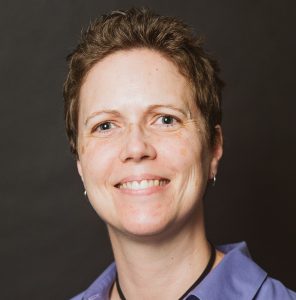 Professor Jennifer Wood, Department of Criminal Justice, Temple University, USA
Professor Jennifer Wood, Department of Criminal Justice, Temple University, USA
Jennifer Wood is a Professor in the Department of Criminal Justice at Temple University in Philadelphia, USA. She received her doctorate in criminology at the University of Toronto. Prior to joining Temple, she served as a Fellow at the Regulatory Institutions Network (RegNet) at the Australian National University.
Jennifer is a criminologist with expertise in policing and regulation. Her previous work examined the ways in which public and private entities link together and function to produce order and security. Her current work focuses on the public health dimensions of everyday police work. Her research seeks to describe and explain the ways in which officers manage behavioral health-related encounters as well as the contexts of their decision-making. She is also engaged in collaborative projects designed to identify and assess pre-arrest interventions for navigating people toward behavioral health and social services.

